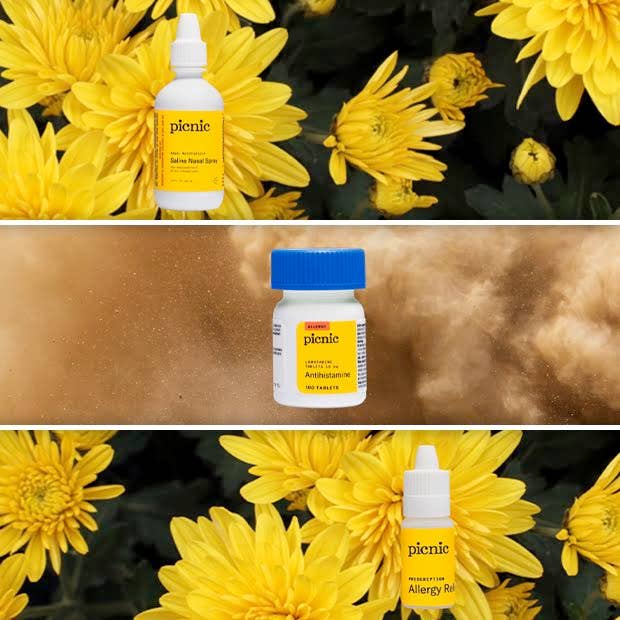Not All Allergy Treatments Are The Same — How To Make The Best Choice For You
Allergies don't have to hold you back.
 Volodymyr TVERDOKHLIB / shutterstock
Volodymyr TVERDOKHLIB / shutterstock Seasonal allergies are incredibly common, and yet they often don’t get the same level of attention or consideration as a cold or flu. “Oh, it’s just allergies!” we exclaim to a friend or coworker when they look concerned at our congestion, coughing or wheezing.
While allergies may not be contagious in the way a virus is, they are still nothing to sneeze at. Allergies are a common challenge many adults and children face.
What is the best allergy medicine for you?
The key to knowing which allergy medication is the best treatment for you is to understand the specific type or types of allergies you're dealing with.
Because there are so many different types of allergies, and different manifestations of how our allergies affect us, it’s easy to choose medication that doesn't turn out to be effective.
Approximately 30% of adults and 40% of children in the U.S. struggle with allergies.
Often, allergy symptoms get bundled into a "catch all" diagnosis of allergies or seasonal allergies, leading people to choose the wrong medication for their specific needs. In fact, 80% of allergy sufferers choose the wrong over-the-counter medication for their symptoms.
The most common types of allergies include:
1. Seasonal allergies (pollen, grass)
2. Environmental allergies (air, water, home/office)
3. Food allergies and intolerance (dairy, wheat, gluten, peanut, shellfish)
4. Drug allergies
5. Skin allergies (often linked to any or all listed above)
Just because you have been suffering from allergies, it doesn't necessarily mean you need to struggle with symptoms or continuously test different treatments.
That's what Picnic Allergy wants to accomplish: giving people who suffer from allergic rhinitis a personalized, effective treatment, instead of simply just "dealing with" their symptoms.
"I’ve given a lot of high fives to patients who tell me my help in managing their allergies has changed their lives. They can sleep, they can smell, and they can be productive. I always say that suffering from allergies isn’t trivial and shouldn’t have to just be endured," says Dr. Amina Abdeldaim, MD MPH, an allergist and Picnic Allergy's Medical Director.

Receive 50% off your first three orders when you make a purchase on Picnic Allergy!
Choosing the best allergy medication starts with identifying the different types of allergy treatments available.
There are many over-the-counter medications for allergies, both pharmaceutical and natural remedies.
The most common types of medicine used to treat allergy symptoms include antihistamines, decongestants and corticosteroids (more on each below) — but none of these treatments resolve the core issue of chronic allergies!
Picnic Allergy offers a genius solution to this problem because it personalizes and customizes treatment for your specific needs.
What else would help deal with those annoying allergy symptoms better than a treatment specifically tailored to your symptoms?
Picnic Allergy has FDA-approved prescription and science-backed over-the-counter treatment options to help those who suffer from allergic rhinitis better manage their symptoms.
And because many allergy sufferers make the mistake of trying to alleviate their symptoms with only one form of treatment, Picnic Allergy makes it easy to use a combination of medications and treatments, known as "toolkitting."
In under three minutes, you can get a personalized recommendation for treating your unique allergy symptoms from a real allergist!
How to choose the best allergy medicine using Picnic Allergy's fast and easy allergy quiz:
1. Fill out a simple and quick questionnaire that covers your various allergy symptoms, treatment history, and preferences. Picnic worked with allergists to help ensure each plan is effective and tailored to each person.
2. The result is a clinically-proven treatment plan for your own symptoms, based entirely on your unique history and needs. That’s how you know it will be the right fit.
3. Picnic Allergy delivers that treatment plan directly to your door, on your schedule. No need to go to a drugstore!
And the best part? Picnic Allergy is offering 50% off your first three orders!

Now, because different symptoms require different treatments, and individuals have their own preferences, Picnic has a wide range of treatment options available.
There are antihistamine eye drops that help to prevent itchy, watery eyes (as low as $26 per month), as well as oral antihistamines to help relieve sneezing, coughing, and other allergy symptoms (as low as $13 per month). In addition, there are nasal sprays for congested, runny or stuffy noses.
And Picnic Allergy offers prescription options.
How do I know if I'm using the correct allergy treatment?
Finding the right allergy treatment for your seasonal allergies is ultimately all about choosing the right treatment for you and your own needs.
“Before you give up, make sure you are taking antihistamines and using nasal sprays correctly and diligently. If you think you’re doing everything right and are getting nowhere, still don’t give up!” recommends Dr. Abdeldaim.
Ultimately, you know you have found the correct match for your symptoms and needs if the allergy treatment works and you start to feel better. And there is no better indicator than that!
Be sure to pay attention to your symptoms and your body, and see how things improve. Adjustments can always be made and Picnic’s team of doctors are available to readjust plans as needed.
Finding the right allergy treatment or combination of treatments can be an ongoing process, as allergies do change over time and can develop with age. Figuring out your allergy treatment plan will involve paying attention to how you feel from season to season, and making adjustments as necessary.
The best allergy treatment for you is related to finding out what causes your symptoms; then, you can figure out the best way to get rid of them.
5 Tips for Finding the Best Allergy Treatment for Your Needs
1. Know your allergy symptoms and triggers.
Sometimes, a way of solving a problem is to find out what caused that problem in the first place. Determining sensitivities or triggers can be a useful weapon in the fight to prevent symptoms before they start.
If you know you are allergic to peanuts, for example, the best way to avoid a problem is to just not eat peanuts — that way, you will never have a reaction to eating peanuts.
It's the same thing for environmental factors. And in the end, prevention is worth an ounce of cure.
While allergy testing can be helpful in finding the source of your allergies, it doesn’t do all that much good if you don’t have a treatment plan that works.
However, allergy testing does help in one way: It allows you to be proactive and prevent symptoms from hitting you in the first place. That is why a combination of your medical history and sensitivity is as important as the treatment itself.
2. Understand the difference between common over-the-counter allergy medications.
There are a lot of different common types of treatments out there, and various kinds will appeal to different levels of allergies and symptoms.
Corticosteroids: Corticosteroids relieve symptoms by temporarily reducing inflammation often associated with allergies. These can often cause disruption to gut health, and experts will often recommend a natural anti-inflammatory supplement instead such as arnica and turmeric.
Antihistamines: Antihistamines block histamine, which is a chemical dispensed by your immune system when an allergic reaction is present. This type of treatment suppresses the body’s expression of the allergic reaction in many cases.
Decongestants: Decongestants are often used for fast, temporary relief of nasal congestion caused by allergies. However, these can sometimes cause sleep disturbances and interruptions, headaches, contribute to dehydration, lead to high blood pressure and even increase irritability. Often, a natural anti-inflammatory will work as effectively without the negative side effects.
3. Take the Picnic Allergy quiz to narrow down your treatment options.
The ideal treatment for you is dependent on what you are allergic to and what your symptoms are — that is why the Picnic Allergy quiz for coming up with a treatment plan is so helpful.
Once you fill out the quick quiz, your results determine an ideal clinically-proven treatment plan for your unique symptoms, which could include a combination of medications, treatments, or natural options: eye drops, nasal spray, antihistamines, nasal steroids, and more.
The idea is to be prepared to get ahead of your allergy season so you can fight those symptoms before they start.

When you shop on Picnic Allergy, receive 50% off your first three purchases!
4. Consider trying natural treatments.
There are some ways we can naturally protect ourselves against allergies, especially if medication is a last resort.
Hydration: When your body is dehydrated, you are more likely to experience allergy symptoms, including coughing, sneezing or congestion.
"Being dehydrated can worsen the sensations of allergic rhinitis, and can lead to a dry, raw throat. So it’s best to pay close attention to your hydration status during your worst seasons," Dr. Abdeldaim suggests.
Other methods of staying hydrated consist of drinking water as soon as you wake up as well as throughout the day, waiting 30 minutes after eating to drink water, having two cups of water before bed, and even hydrating before and after showering.
Diet: You can also change your diet, as some foods do have the ability to clear nasal passages. Onions, in particular, have been quite effective, though there haven’t been a lot of studies on them.
Adds Dr. Abdeldaim, "Onions contain a plant pigment called quercetin, which is sort of like a natural antihistamine, though there isn’t a great deal of data of quercetin’s efficacy. So, go ahead and incorporate some raw onions in your diet and see if it helps. Just make sure to have some breath mints handy."
But beware of methods like eating spicy foods, because although it can make your nose run and relieve congestion, it's only temporary.
"Some people can actually develop a stuffy nose from eating spicy foods (this is called a vasomotor reflex, meaning the blood vessels in your nose can swell and leak)," warns Dr. Abdeldaim.
Apple cider vinegar has been shown to boost the immune system, so consider adding it to your daily salad dressing or smoothies. However, don't rely on it for a quick fix.
In addition, if you find certain foods trigger your allergies and make them worse — dairy, for instance — make a note of that and cut back.
Saline nasal rinses: Studies have found that individuals suffering from chronic sinus symptoms experienced a 64% improvement in the severity of their symptoms, when using saline irrigation once per day.
Aromatherapy: Another natural treatment is the use of essential oils, or aromatherapy, and uses what you smell to treat other parts of your body. Essential oils can be used in the bath or shower, applied on the skin, or sprayed or diffused into the air.
In a study that used a blend of frankincense, Ravensara oils, and sandalwood to treat rhinitis, researchers found that participants saw improvement in symptoms like sneezing, itchy nose, and blocked nasal passages.
5. Acknowledge the importance of using combination treatments/medications.
Often, the right answer for someone’s allergy treatment needs involves a combination of medications. In fact, studies have shown “toolkitting,” or a combination of treatments, shows positive results.
“Combination therapy of histamine and leukotriene antagonists produces symptomatic improvement as well as improved quality of life,” read one study about allergic rhinitis, a common condition where the nose becomes inflamed due to allergens.
Everyone experiences their allergies differently, which is why it is helpful to have a unique treatment that may be a combination of treatments that work for your own needs.
-Created in partnership with Picnic Allergy
Aly Walansky is a lifestyle journalist with nearly two decades of experience covering health and wellness. Follow her on Instagram.
YourTango may earn an affiliate commission if you buy something through links featured in this article.
